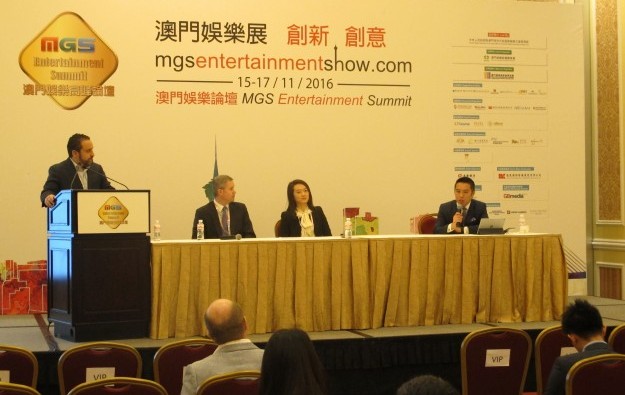Small operators to drive Asia casino growth: analysts
Nov 17, 2016 Newsdesk Macao Gaming Show 2016

Growth in the total number of casinos in Asia will continue to be in the hands of small operators, according to investment analysts covering the regional gaming industry.
“The future as it relates to the growth of gaming in Asia – and the development of gaming in Asia – belongs to second-, third- and fourth-tier companies,” said analyst Grant Govertsen (pictured, left centre), from Union Gaming Securities Asia Ltd.
He was speaking on Wednesday at the conference segment of the Macao Gaming Show 2016, at the Venetian Macao.
“The reality is that there are only a couple of really significant opportunities [in Asia] for major resorts that will move the needle” in earnings terms for major international casino operators, he added. Casino development in existing regional markets excluding Macau and Singapore would continue to be driven by projects led by small firms.
The Union Gaming analyst said smaller stocks in the Asian casino sector could be very attractive investment plays. “If you are an investor, there is probably more money to be made investing in those second-, third-, fourth-tier stocks than there might be investing in the stocks of large casino firms,” he said.
Fellow panel speaker Marcus Liu (pictured, right), regional gaming analyst at brokerage CLSA Ltd, agreed small gaming jurisdictions in Asia were not attractive for large international casino firms.
“I don’t think large international operators would be interested in a casino in Vietnam or Taiwan,” he said. “South Korea could have potential if they allowed locals to gamble,” added Mr Liu.
South Korea currently has 17 casinos, but the country’s nationals are only allowed to gamble at one of them – Kangwon Land in an upland area of Kangwon province.
Chelsey Tam (pictured, right centre), equity analyst at Morningstar Investment Management Asia Ltd – and also a speaker on Wednesday’s panel – said one problem with second-tier casino jurisdictions in Asia, from the perspective of large operators, was the difficulty of navigating the respective regulatory environments.
“I would really struggle to see why big operators would go to really small markets: you would have to go through all this trouble, but in the end it really doesn’t move the needle for you,” observed Ms Tam.
A 2015 report from CLSA estimated there were approximately 200 casinos operating in Asia.
“That number is servicing a population of about 4 billion people,” said Mr Liu. He compared the figure with the United States – a “very mature market – where “there are probably over 1,000 casinos serving a population of about 300 million”.
He added: “We still think the supply dynamics in Asia are very favourable. There are large concentrations of casinos in pocket spaces, but there are also places where you need to fly for several hours before you get to a casino.”
The CLSA analyst acknowledged this was not a simple equation. “There are a lot of political impediments to opening casinos in a lot of these places.”
The three investment analysts agreed the potential legalisation of casino gambling in Japan would be a major development for the industry in Asia.
Japan has a “ready-made market” for the casino industry, Mr Liu said, adding that other forms of gambling already legal in that country enjoy high revenue levels. “Every big hitter in the world would want a piece of that [casino market].”
Related articles
-
 AGI flags 2024 US$172mln capex for...
AGI flags 2024 US$172mln capex for...Jul 19, 2024
-
 Andrew Lo new Suntrust president as...
Andrew Lo new Suntrust president as...Jul 16, 2024
More news
-
 Donaco EBITDA up y-o-y to above US$4mln...
Donaco EBITDA up y-o-y to above US$4mln...Jul 26, 2024
-
 HK listed Palasino upgrades Czech...
HK listed Palasino upgrades Czech...Jul 26, 2024
Latest News
Jul 26, 2024
Border-casino operator Donaco International Ltd has achieved a 164.17-percent year-on-year increase in its latest quarterly group earnings before interest, taxation, depreciation and amortisation...Sign up to our FREE Newsletter
 (Click here for more)
(Click here for more)
Pick of the Day
”We’ve got more traction outside of Macau at the moment. But Macau’s going be a bigger focus for us”
David Punter
Regional representative at Konami Australia
Most Popular
 Sheraton brand to exit Londoner Macao, to be Londoner Grand July 25, 2024
Sheraton brand to exit Londoner Macao, to be Londoner Grand July 25, 2024  Macau regulator probes unlicensed gaming agents July 24, 2024
Macau regulator probes unlicensed gaming agents July 24, 2024  Philippines gives 20k aliens in POGOs 60 days to leave July 25, 2024
Philippines gives 20k aliens in POGOs 60 days to leave July 25, 2024  Philippines-listed DigiPlus says not affected by POGO ban July 24, 2024
Philippines-listed DigiPlus says not affected by POGO ban July 24, 2024  Sands China 2Q EBITDA down q-o-q amid low hold, renovation July 25, 2024
Sands China 2Q EBITDA down q-o-q amid low hold, renovation July 25, 2024






